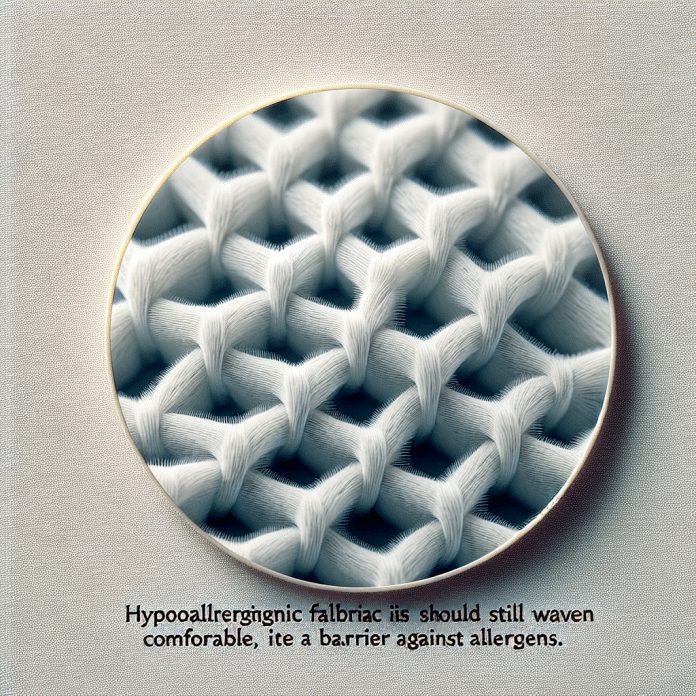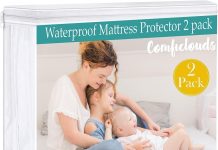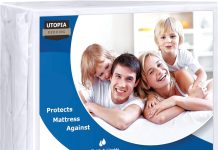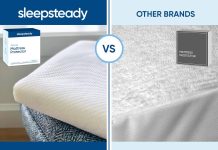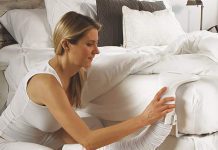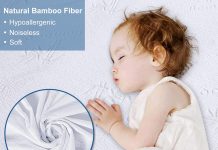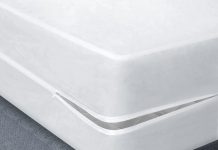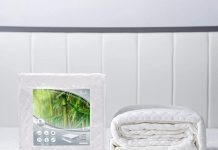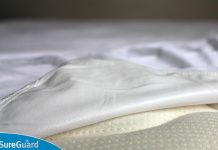If you find yourself constantly suffering from allergies, you’ll know just how frustrating it can be to have your sleep interrupted by sneezing, itching, and congestion. That’s where a mattress protector comes in. But with so many options available, it can be overwhelming to determine which one is best suited to alleviate your allergy symptoms. In this article, we’ll explore the various types of mattress protectors designed specifically for allergies, helping you find the perfect shield to protect both you and your sleep from those pesky allergens.
Review contents
Why You Need a Mattress Protector for Allergies
Allergies can be a real nuisance, and finding relief can sometimes feel like an uphill battle. One area that often goes overlooked when it comes to allergies is the mattress. With all the time we spend sleeping on our mattresses, it’s important to ensure that they are allergen-free. This is where a mattress protector for allergies comes in.
Common Allergens Found in Mattresses
Mattresses are a breeding ground for allergens, harboring dust mites, pet dander, mold, and other irritants that can trigger allergic reactions. Dust mites, in particular, are a common allergen found in mattresses, feeding on dead skin cells and leaving behind waste particles that can cause allergies. For those with asthma, dust mites can also exacerbate their symptoms. Additionally, pet dander from furry companions who share our beds can also contribute to allergies.
Importance of Protecting Against Allergens
Protecting against allergens is crucial for maintaining a healthy and comfortable sleeping environment. Allergens can disrupt our sleep and lead to symptoms such as sneezing, itching, congestion, and even more severe reactions in some cases. By using a mattress protector for allergies, you create a barrier between yourself and these irritants, reducing your exposure and minimizing the risk of triggering allergic reactions.
Benefits of Using a Mattress Protector for Allergies
Using a mattress protector specifically designed for allergies offers numerous benefits. Firstly, it creates a physical barrier that prevents allergens from penetrating the mattress and coming into contact with your skin. This can significantly reduce the presence of dust mites, pet dander, and other allergens in your sleeping environment.
Secondly, a mattress protector for allergies is often made with hypoallergenic materials, such as tightly woven fabric or special allergy-resistant coatings. These materials are designed to repel allergens and inhibit their growth, further minimizing the risk of allergic reactions.
Lastly, a mattress protector can also extend the lifespan of your mattress by shielding it from sweat, stains, and spills. This can save you money in the long run by reducing the need for professional cleaning or premature mattress replacement.
Key Features to Consider
When choosing a mattress protector for allergies, there are several key features to consider. These features will ensure that you select a protector that effectively safeguards against allergens while providing the comfort and convenience you desire.
Allergen Barrier
The primary purpose of a mattress protector for allergies is to create a barrier that prevents allergens from infiltrating your mattress. Look for protectors with tight-weave fabrics or special laminate coatings that effectively block out dust mites, pet dander, pollen, and other irritants.
Breathability
A mattress protector should allow for adequate airflow to keep you cool and comfortable throughout the night. Look for protectors that are breathable and promote good ventilation to prevent heat and moisture buildup.
Waterproofing
In addition to protecting against allergens, a mattress protector should also guard against spills and stains. Look for protectors with waterproof or water-resistant properties to keep your mattress clean and fresh.
Ease of Cleaning
To maintain a healthy sleeping environment, regular washing of your mattress protector is essential. Look for protectors that are easy to remove, machine washable, and quick to dry. Some protectors may also have stain-resistant or anti-microbial properties, making cleaning even easier.
Noise
Nobody wants a mattress protector that rustles and makes noise every time you move. Look for protectors that are noiseless and discreet, providing a quiet and uninterrupted sleep.
Comfort
A mattress protector should enhance your sleeping experience, not detract from it. Look for protectors that add a layer of plushness or cushioning for extra comfort without sacrificing breathability.
Hypoallergenic Materials
Ensure that the materials used in the mattress protector are hypoallergenic and resistant to allergen growth. Common hypoallergenic materials include cotton, polyester, and microfiber.
Bed Bug Protection
If you live in an area prone to bed bugs or want extra protection, consider a mattress protector that offers bed bug resistance. Look for protectors with a zipper enclosure or advanced bed bug-proof technology.
Warranty
A good warranty provides peace of mind and ensures that you are protected against any defects or issues with the mattress protector. Check the warranty offered by the manufacturer and make sure it aligns with your expectations.
Price Range
Consider your budget when selecting a mattress protector, as prices can vary significantly. Look for protectors that offer the best balance of quality, features, and affordability within your price range.
Top 5 Mattress Protectors for Allergies
Here are our top five recommendations for mattress protectors that excel in protecting against allergens while providing comfort and convenience.
1. Brand A Mattress Protector
Brand A offers a mattress protector specifically designed for allergies, with a tight-weave fabric that effectively blocks out dust mites, pet dander, and other allergens. It also features waterproofing and breathability, ensuring a clean and comfortable sleep. With easy machine washability and a noiseless design, Brand A’s mattress protector is an excellent choice for those with allergies.
2. Brand B Mattress Protector
Brand B’s mattress protector is crafted from hypoallergenic materials, providing an effective barrier against allergens. It offers waterproofing, breathability, and easy cleaning, making it a practical choice for allergy sufferers. The protector’s comfort-enhancing features ensure a luxurious sleep experience while protecting against allergens.
3. Brand C Mattress Protector
Brand C’s mattress protector stands out with its advanced bed bug protection technology. In addition to its hypoallergenic properties, it features a secure zipper enclosure that prevents bed bugs from infiltrating your mattress. With its breathability and ease of cleaning, Brand C’s protector offers comprehensive protection for those with allergies and bed bug concerns.
4. Brand D Mattress Protector
Brand D’s mattress protector boasts a unique quilted design that adds an extra layer of comfort. Made from hypoallergenic materials, it effectively repels allergens while providing breathability. The protector is also waterproof and easy to clean, ensuring a fresh and allergen-free sleeping environment.
5. Brand E Mattress Protector
Brand E offers a mattress protector with a focus on breathability and cooling properties. Made with innovative fabrics, it promotes air circulation and prevents heat buildup. This protector also features a noiseless design, waterproofing, and hypoallergenic properties, making it an excellent choice for allergy sufferers seeking enhanced breathability.
Comparison of Top Mattress Protectors
When comparing the top mattress protectors for allergies, it’s important to evaluate key factors to make an informed decision.
Material Composition
Each mattress protector may use different materials, so it’s important to consider your preferences and any allergies or sensitivities. Look for protectors made from hypoallergenic, breathable, and durable materials like cotton, polyester, or microfiber.
Allergen Protection
Consider the level of allergen protection each mattress protector offers. Check for features like a tight-weave fabric, anti-allergen coatings, and bed bug resistance to ensure comprehensive protection against allergens.
Breathability and Airflow
Evaluate how breathable each mattress protector is to ensure proper air circulation and prevent heat buildup. Look for protectors with features like moisture-wicking fabrics or ventilation channels.
Waterproofing
Consider the level of waterproofing each mattress protector provides to protect your mattress from spills and stains. Look for protectors with a waterproof membrane or water-resistant treatment.
Ease of Cleaning
Look for mattress protectors that are easy to clean and maintain. Consider protectors that are machine washable and quick to dry, with stain-resistant or anti-microbial properties for added convenience.
Noise Level
Ensure that the mattress protector is noiseless and discreet, so it doesn’t disturb your sleep. Look for protectors made with noise-reducing materials or fabrics.
Comfort
Consider the comfort features offered by each mattress protector, such as cushioning or quilted designs. Look for protectors that enhance your comfort without compromising breathability or allergen protection.
Additional Features
Some mattress protectors may offer additional features like dust mite protection, anti-microbial treatments, or temperature regulation. Consider these features based on your specific needs and preferences.
Available Sizes
Check the available sizes for each mattress protector to ensure compatibility with your mattress. Most protectors come in standard sizes, but it’s essential to verify that your mattress dimensions align with the protector’s dimensions.
Price
Consider your budget when comparing mattress protectors. Take into account the features, quality, and durability offered by each protector and choose the one that provides the best value for your money.
Factors to Consider When Choosing a Mattress Protector for Allergies
To select the best mattress protector for allergies, consider the following factors:
Existing Allergies or Sensitivities
Take into account any existing allergies or sensitivities you have. If you know specific allergens that trigger your reactions, look for protectors with specialized features to repel those allergens.
Type of Allergens You Need Protection From
Identify the specific allergens you need protection from, such as dust mites, pet dander, or pollen. Choose a mattress protector that offers the best defense against those allergens.
Sleeping Preferences
Consider your sleeping habits and preferences. If you tend to sleep hot, prioritize a breathable mattress protector that promotes good airflow. If you have concerns about spills, look for a protector with excellent waterproofing properties.
Mattress Compatibility
Ensure that the mattress protector is compatible with your mattress size and depth. Measure your mattress dimensions and compare them to the protector’s sizing options.
Personal Comfort
Choose a mattress protector that enhances your comfort and sleep quality. Consider features like cushioning, quilted designs, or temperature regulation based on your preferences.
Budget
Set a budget for your mattress protector and prioritize options that fit within your financial constraints. Remember to find a balance between price and quality, selecting a protector that offers the best value for your investment.
How to Evaluate the Allergen Protection
Ensuring effective allergen protection is crucial when choosing a mattress protector for allergies. Consider the following factors to evaluate the level of protection offered:
Certifications
Look for certifications or endorsements from reputable organizations that validate the allergen protection claims of the mattress protector. Certifications like Oeko-Tex Standard 100 or asthma & allergy friendly® can provide assurance of quality.
Allergen Barrier Effectiveness
Research the materials and construction of the mattress protector to determine its effectiveness as a barrier against allergens. Features like tightly woven fabrics, special coatings, or microscopic pore sizes indicate a high level of allergen protection.
Customer Reviews and Ratings
Read reviews and ratings from customers who have purchased and used the mattress protector. Look for feedback specifically related to allergen protection and how well the protector has minimized allergic reactions.
Expert Recommendations
Consult experts in the field of allergies, sleep, or mattress protection for their recommendations on the best mattress protectors for allergies. Consider their expertise and insights when making your decision.
Testing Methods
Check if the mattress protector has undergone independent testing to validate its allergen protection claims. Testing procedures such as allergen challenge tests can provide scientific evidence of a protector’s effectiveness.
Tips for Maintaining a Mattress Protector for Allergies
To ensure your mattress protector remains effective in safeguarding against allergens, follow these maintenance tips:
Regular Cleaning Schedule
Establish a regular cleaning schedule for your mattress protector to prevent allergen buildup. Ideally, aim to wash it every few months or as recommended by the manufacturer.
Proper Washing Instructions
Follow the manufacturer’s instructions for washing and drying your mattress protector. Use gentle cycle settings, mild detergents, and avoid high heat if not recommended, as these can damage the protector or reduce its effectiveness.
Stain Removal Techniques
If stains occur on your mattress protector, spot clean them promptly using appropriate stain removal techniques recommended by the manufacturer. Avoid using harsh chemicals or scrubbing vigorously, as this may damage the protector’s materials.
Promptly Addressing Accidents
If accidents or spills occur on the mattress protector, address them promptly to prevent staining, odor, or mold growth. Blot the spill immediately with a clean cloth, then follow the manufacturer’s instructions for stain removal and cleaning.
Replacement Timeline
Monitor the condition of your mattress protector and replace it when signs of wear or damage are evident. On average, a mattress protector can last 2-5 years, but this may vary depending on usage and quality.
Use with Other Bedding Accessories
Consider using additional bedding accessories, such as pillow protectors or duvet covers, that offer the same allergen protection as your mattress protector. This creates a comprehensive barrier against allergens and maintains a clean sleeping environment.
Lifespan and Warranty Information
Understanding the lifespan and warranty information of a mattress protector is essential when making a purchase. Consider the following:
Average Lifespan of a Mattress Protector
On average, a high-quality mattress protector can last anywhere from 2-5 years with proper care and maintenance. However, some protectors may last longer or shorter periods, depending on their materials and construction.
Manufacturer’s Warranty
Check the warranty provided by the manufacturer. A good warranty should cover defects in materials or workmanship and specify the duration of coverage. Ensure that the warranty aligns with your expectations and provides adequate protection.
Return Policy
Review the return policy of the manufacturer or retailer. Understand the conditions under which you can return or exchange the mattress protector, as well as any associated costs or restocking fees.
Customer Support
Consider the level of customer support offered by the manufacturer or retailer. Look for companies that are responsive, helpful, and committed to resolving any issues or concerns regarding your mattress protector.
Frequently Asked Questions (FAQs)
Here are answers to some commonly asked questions about mattress protectors for allergies:
Can a mattress protector completely eliminate allergies?
While a mattress protector can significantly reduce exposure to allergens, it cannot completely eliminate allergies. It creates a barrier against dust mites, pet dander, and other irritants, but additional measures like regular cleaning and allergen avoidance are still necessary.
Are mattress protectors safe for children and pets?
Mattress protectors are generally safe for children and pets. Look for protectors made from hypoallergenic materials that offer protection against common allergens without posing any risks to their health or safety.
How often should a mattress protector be replaced?
The lifespan of a mattress protector can vary, but on average, it should be replaced every 2-5 years. However, if a protector becomes damaged, loses effectiveness, or no longer provides adequate allergen protection, it should be replaced sooner.
Are mattress protectors machine washable?
Many mattress protectors are machine washable. Check the manufacturer’s instructions for the specific care and washing instructions of your protector. Follow these instructions to maintain its effectiveness and prolong its lifespan.
Can a mattress protector improve sleep quality?
A mattress protector can indirectly improve sleep quality by creating a cleaner and more comfortable sleeping environment. With reduced exposure to allergens and the added benefits of waterproofing and breathability, it can contribute to a more restful and allergen-free sleep experience.
Do mattress protectors change the feel of the mattress?
Mattress protectors can have a minimal impact on the feel of the mattress. Look for protectors that offer cushioning or quilted designs if you desire additional softness or comfort. However, most protectors are designed to be thin and discreet, minimizing any noticeable change in mattress feel.
Can a mattress protector prevent bed bugs?
Certain mattress protectors are specifically designed to prevent bed bugs. Look for protectors with bed bug-resistant features, such as zipper enclosures or advanced bed bug-proof technology, to significantly reduce the risk of infestation.
What should I do if I have specific allergies or sensitivities?
If you have specific allergies or sensitivities, it’s important to choose a mattress protector that offers specialized allergen protection. Look for protectors that specifically target the allergens triggering your reactions, such as allergen proof or anti-dust mite protectors.
Conclusion
In conclusion, investing in a high-quality mattress protector for allergies is essential for maintaining a healthy and comfortable sleeping environment. The right protector can effectively repel allergens, provide breathability, waterproofing, and comfort, helping to alleviate allergic reactions and improve overall sleep quality.
By considering factors such as allergen protection, breathability, ease of cleaning, and user reviews, you can select the best mattress protector for your specific needs. Regular cleaning and proper maintenance will ensure the protector remains effective in guarding against allergens.
With numerous options available, take the time to evaluate your personal preferences, budget, and mattress compatibility. By doing so, you can make an informed decision and enjoy a restful and allergen-free sleep night after night.

